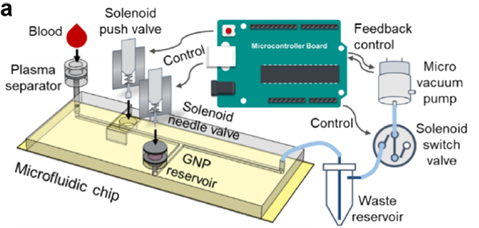Heart failure is a serious global burden affecting more than 64 million people worldwide. It has high morbidity and mortality and poor quality of life, making it a major public health priority. N-terminal proBNP (NT-pro-BNP) is a well-established clinical biomarker for monitoring and managing heart failure. Regular and frequent monitoring of patients with heart failure is needed to minimize hospitalization and improve mortality. However, current commercial and research NT-pro-BNP assays are large, or complicated, and rarely satisfy clinical requirements for sensitivity or precision. A POC test for NT-proBNP that is sensitive, whole blood compatible and easy to use would go a long way in monitoring and managing heat failure.
Researchers at the Biodesign Institute of Arizona State University have developed a digital counting-based microfluidic nanobiosensor for quantifying NT-proBNP concentrations in whole blood samples with a POC compatible protocol. This nanobiosensor uses a microfluidic device that has been engineered to have an integrated control circuit so that the digital NT-proBNP immunoassay is run automatically. Detection can be achieved in 10 minutes, in the range of 50-10,000 pg/mL from a mere 7 µl of whole blood sample. Validated with 15 clinical serum samples, showing good linear correlation with the commercial Elecsys proBNP II assay.

This microfluidic digital nanobiosensor is sensitive and POC compatible, making it a promising option for decentralized monitoring of heart failure.
Potential Applications
- POC detection of NT-proBNP
- Monitoring and managing heart failure and other conditions
- Predicting LVEF
- Prognostics to identify people at risk of developing heart failure
Benefits and Advantages
- Detects and quantifies NT-proBNP
- Achieves NT-proBNP detection in the range of 50-10,000 pg/mL from only 7 µl of whole blood
- 10-minute assay time
- Automated whole blood plasma extraction and processing on the microfluidic device
- Does not require manual sample preparation
- When validated on clinical serum samples, it showed good linear correlation with the commercial Elecsys proBNP II assay
- Meets the sensitivity, precision, reproducibility and concentration range requirements
For more information about this opportunity, please see
For more information about the inventor(s) and their research, please see